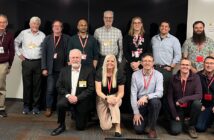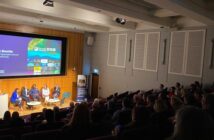International researchers – including experts from The Open University – have mapped the distribution of over $1 trillion losses from potentially worthless oil and gas assets to the individuals, pension funds and governments who will be impacted, as nations rush to reach their pledges of achieving ‘net-zero’.
Driven by technological, societal, and political change, renewable energy technologies are replacing fossil fuels. This latest research – published in Nature Climate Change and coordinated by the OU – has highlighted the potential losses due to oil and gas being over-produced and becoming ‘stranded assets’ (assets with an unanticipated or premature loss in value). Going a step further, it identified which organisations and individuals face the biggest financial blow as a result.
More than 40,000 oil and gas production assets were examined
The potential cost of overvaluing oil and gas assets could be over $1 trillion, a figure higher than the housing market mispricing that triggered the global 2007 financial crisis.
Dr Philip Holden, Senior Lecturer in Earth System Science at the OU who co-led the research, developed an ‘equity ownership network’ model to map the financial losses to their ultimate owners.
The international team of researchers examined over 40,000 oil and gas production assets and estimated their output and value under a scenario with strict but plausible climate policies.
The researchers found that approximately $550 billion of losses are located in OECD (Organisation for Economic Co-operation and Development) member countries, which includes the UK, United States and over 30 other developed nations. Nearly $300 billion worth of production losses were identified in the US alone.
Complex network of equity ownership revealed
They mapped these losses initially to oil and gas companies, and then through intermediaries like financial institutions to their ultimate owners, passing through an ‘equity ownership network’ of 1.8 million companies before they were finally allocated to either governments or individuals through funds or shareholdings.
Additionally, Dr Holden points out:
“The complex network of equity ownership transfers more than $200 billion of additional stranded asset risk to OECD-based investors, including $100 billion of losses originating at Russian oil and gas fields.”
Principal Investigator (PI) of the research grant and Professor of Earth System Science at the OU, Neil Edwards, commented:
“The huge complexity of the global financial system is a major source of concern for its potential to redistribute and amplify financial risk arising in the climate transition – our study shows it is possible to track and quantify at least part of that risk, and its implications for individuals and governments”
When the losses are traced to their ultimate owners, governments directly own about one-third, with private persons owning the other two-thirds via funds – including pension funds – and shareholdings, the researchers found.
The financial geography should be of interest to financial regulators in OECD countries and the major exposure of pension funds raises questions about the sustainability of some private pension funds. Yet, the direct economic consequences of unemployment and adverse consequences for government finances, the researchers found, are likely to be largest in undiversified developing producer countries where governments hold most of the risks.
Dr Holden added:
“Divestment isn’t the only choice for investors, who could instead use their influence to pressurise companies to stop making new fossil fuel investments. Investors have both risk and responsibility, and ethical choices may help preserve both the value of their investments and the climate.”
The research – funded by a grant from the UK’s Natural Environment Research Council – was carried out by the OU, the University of Massachusetts Amherst in the United States, the University of Exeter, the University of Cambridge (C-EENRG), Cambridge Econometrics and the University of London in the United Kingdom. The overall grant project was coordinated and led by The Open University.



